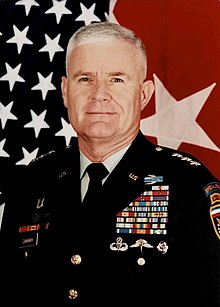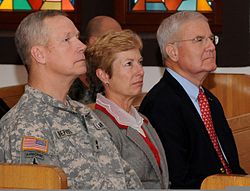Michael Canavan
Michael A. Canavan | |
|---|---|
 | |
| Allegiance | United States |
| Service | United States Army |
| Years of service | 1966–2001 |
| Rank | Lieutenant General |
| Commands | Joint Special Operations Command Special Operations Command, Europe TRADOC Analysis Command 1st Battalion (A-401), 5th Special Forces Group |
| Battles / wars | Vietnam War |
| Awards | Defense Distinguished Service Medal (2) Defense Superior Service Medal Legion of Merit (2) Bronze Star Medal (2) Purple Heart |
Michael A. Canavan is a retired United States Army lieutenant general and former Federal Aviation Administration security official.[1]
Canavan presently sits on the board of defense contractor USfalcon.[2]
Canavan commanded Special Operations Command Europe and the Joint Special Operations Command, and retired after serving as the chief of staff for the United States European Command. On the morning of the September 11 attacks, he was in Puerto Rico and had failed to designate a replacement. In the wake of the attacks, Canavan resigned his position as Associate Administrator for Civil Aviation Security at the FAA amid controversy over Air Marshal assignments to Bush administration Cabinet members and confidence in his leadership.[3][4]
As a major general Canavan led the team in Croatia that recovered and identified the bodies from the 1996 crash of an Air Force CT-43, which killed the Commerce Secretary, Ronald H. Brown.[5]

Canavan is married to Ambassador Katherine Canavan.[citation needed]
References
- ^ Rebecca Trexler. "U.S. Army Lt. Gen. Michael Canavan Named to Head FAA Office of Civil Aviation Security". Federal Aviation Administration. Archived from the original on 2012-10-22.
- ^ "USfalcon Biography" (PDF). USfalcon.
- ^ Blake Morrison and Alan Levin (October 11, 2001). "FAA security chief quits over assignment". USA Today.
- ^ Matthew L Wald (October 5, 2001). "A NATION CHALLENGED: THE F.A.A.; Security Chief Leaving Post". New York Times.
- ^ R. W. APPLE Jr (April 5, 1996). "CRASH IN THE BALKANS: THE OVERVIEW;Bad Equipment Tied to Crash, Perry Suggests". New York Times.
